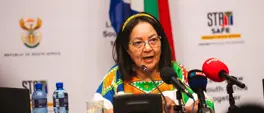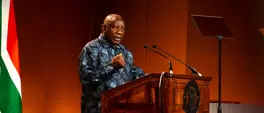'Our revolution': Queer Myanmar couple tie knot at Thai Pride
AFP
28 May 2024 | 5:08Denied the chance to celebrate their union in their homeland, where LGBTQ people face persecution and imprisonment, the couple sought peace and happiness in the more tolerant kingdom next door.
CHIANG MAI - Cheers erupt as Nyan and Mae, a queer couple from Myanmar, tie the knot in front of thousands at the annual Pride parade in the northern Thai city of Chiang Mai.
Denied the chance to celebrate their union in their homeland, where LGBTQ people face persecution and imprisonment, the couple sought peace and happiness in the more tolerant kingdom next door.
The late-night ceremony on Sunday was only symbolic, but the Thai parliament is expected to finalise same-sex marriage legislation later this year, perhaps as soon as October.
When it does, Nyan and Mae plan to wed for real.
"This is an opportunity we cannot get in our country," Mae, an environmental activist who identifies as female and queer, told AFP.
"We will get this chance here."
Thailand is on the way to becoming the first Southeast Asian nation to recognise marriage equality, with two more votes needed in parliament before it becomes law.
The development has cemented Thailand's reputation as a safe space for the LGBTQ community in the region.
Across Asia, only Taiwan and Nepal recognise same-sex marriage.
Mae, 40, who exchanged rings with Nyan, 45, in a separate spiritual ceremony at a local Buddhist temple before the parade, told AFP before that a union in their homeland was out of the question.
Same-sex relations are illegal in Myanmar under laws dating back to British colonial rule and, while these are not always rigorously enforced, members of the LGBTQ community say they are subject to frequent abuse, discrimination and imprisonment.
A night-time curfew remains in place in commercial capital Yangon, as security forces struggling to quell opposition to junta rule carry out regular raids and arrests.
'THIS IS OUR REVOLUTION'
Myanmar is in the grip of a spiralling conflict between the military and various armed resistance forces, sparked by a military coup in 2021.
According to the United Nations the conflict has left around 2.7 million people displaced, while the military has been accused of serious rights abuses as it cracks down on dissent.
For Nyan, a researcher who identifies as queer, getting hitched in Thailand is an act of revolution in itself.
"In Myanmar, everyone is risking their lives to fight against the military for justice," Nyan told AFP.
"This is our revolution - we are getting married and drawing strength from other people fighting for justice.
"We are very proud of it, and I am thankful to people who are fighting for justice."
Chiang Mai - the largest city in northern Thailand - has become a haven for people fleeing the violence and instability in Myanmar since the coup, and now boasts a significant community of emigres.
Nyan said he and Mae, who he first met in her office in Bangkok in 2022, felt accepted and welcomed in their adopted home.
"I think this society really recognises us," he said.
"We are really thankful to the Thai people and the Chiang Mai community for letting us stay here."
AFP is using Nyan and Mae's chosen names, which they feel best represent their identities, rather than those given at birth.
While Thailand has long enjoyed an international reputation for tolerance of the LGBTQ community, campaigners struggled long and hard to make progress.
Much of the Buddhist-majority country remains conservative and LGBTQ people, while highly visible, still face barriers and discrimination.
PROGRESS, BUT SLOWLY
Around 2,000 to 3,000 people joined Sunday's Pride parade in Chiang Mai, but the first such event in the city in 2009 was cancelled after protest by anti-LGBTQ protesters threatened to turn violent.
Sirisak Chaited, the organiser of Chiang Mai's Pride event said it made him happy to see couples from neighbouring countries celebrating Pride in the city.
"It means that the significance of our movement is not only impacting Thailand but also other ASEAN nations," Sirisak told AFP.
"If Thailand passes the [same-sex marriage] law, it could be used as a role model for our neighbouring countries to fight for same-sex marriage like us."
But they also lamented the slow pace of change.
"This law should be out already," they said.
"It's a basic human right that everybody should already have. This law isn't only for LGBTQ couples, but for all."
If the law goes through, more couples will be welcome to celebrate their unions at Chiang Mai's Pride event in 2025, Sirisak said.
By then Mae and Nyan hope to have exchanged their vows and be well into their first year of marital bliss.
















